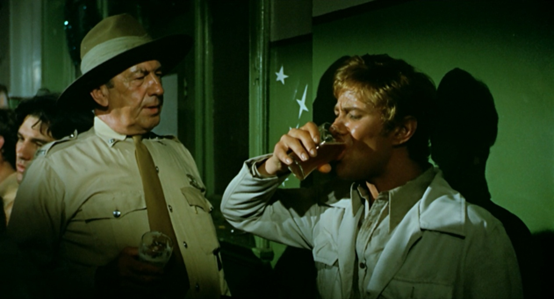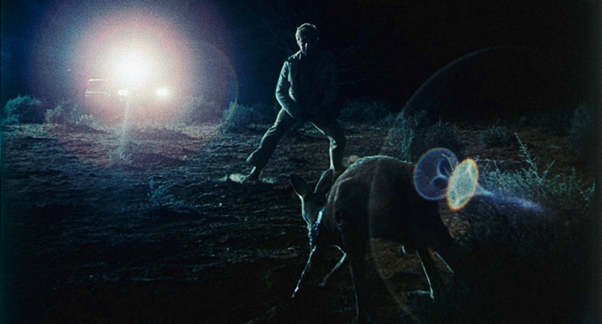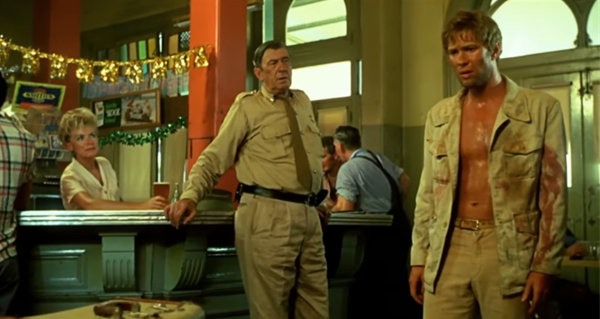Isolation in the Outback - Wake in Fright
- Freddie Bull
- Feb 10, 2023
- 5 min read
Updated: Feb 20, 2023
Spoilers included.
Once believed to be gone forever and known as ‘Australia’s great lost film’, Wake in Fright (1971) is an Aussie classic that displays the depths of isolation in unknown lands.
The film opens with a 360-degree shot of the Aussie outback that lasts a whole minute. All we see is a railroad, two shack-like buildings, and some telephone lines. This is a landscape of abstraction, a place of nothingness. Director Ted Kotcheff forces us to witness this, brilliantly setting the tone for the rest of the film.

The story follows schoolteacher John Grant (Gary Bond) as he sets off to Sydney. His journey begins in Tiboonda, the barren town where he has been sent to work. He describes himself as a ‘slave’ to the education system, as he has no say as to where he is located. On his way to his holiday destination, he stops off at a place called Bundanyabba. The first person he meets here proclaims, ‘It’s the best place in Australia, everybody likes the Yabba!’
As John settles into this place for the night, the stark differences between his sane-self and the locals become clear. His choice of leisure for the night is to go to the local bar, of which the first shot we see is from the inside, of a sign disclosing that the bar closes at 6:30 pm ‘by order’; above, a clock appears, showing the time to be well into the evening. Already, it is clear that the Yabba is an unusual place. The film cuts to different angles of the bar, showing that much like the beer glasses, the bar is filled to the brim, as folk joyfully sing together. Even so, John decides to get a drink and stand in a corner, avoiding the masses. Jock Crawford, a police officer, soon makes himself known to John. The mere presence of a man of the law highlights the farcical nature of the place considering the legal disposition. The dynamic between the two is obvious from the outset as Jock is generous, buying John a drink, while John is sarcastic and condescending. This is matched in appearance, as the policeman is played by Chips Rafferty, who was often described as the stereotypically rugged, straightforward Aussie, while Gary Bond was a handsome Englishman, unfamiliar with the outback. As they continue their conversations, again, the Yabba is described positively. ‘Honestest little town in Australia this is, mate’, says Jock. He adds, ‘We’re so isolated there’s nowhere to go,’ to which John replies, ‘Well, that’s one way of getting out of town.’ John’s continuous dismissal of the town’s praise sets him apart from its inhabitants, while the subtle foreshadowing lingers.

Soon, John finds himself entranced with a game of heads and tails he previously described as ‘simple-minded’. He starts winning big money and, after a break, thinks that if he puts all the money to his name on one more bet, he can get out of the outback permanently and be with what we can assume is his girlfriend, who he has a picture of holding a surfboard and enjoying the beach. Unfortunately for him, he loses the bet and ends up penniless, stranded in a foreign land. What follows is John’s descent into madness. He drinks more and more, becomes quick-tempered, fails to even enter the labour office, and explicitly exclaims that he doesn’t like the Yabba, to the locals’ surprise. He even goes on to say, ‘this is bad enough, but even Sydney… I’d really like to get to England.’ Yet, he couldn’t be further from the possibility of making this happen.
The film almost cycles through the motions as it breaks genre norms, standing as a culmination of comedy, horror, and thriller. This style is carried out abrasively but with excellent craft, as Wake in Fright cycles through the motions. At night, Jack endures the rugged culture, drinking his loneliness away. While in the morning, light pierces his eyes as he awakens in a state of panic, full of despair and growing depravity, setting the endless cycle anew again.
The vast openness of the outback comes to characterise these themes and John’s growing isolation. It feels foreign to all but has a hypnotic allure. While talking to Janette (Sylvia Kay), the ambiguous love interest of the men in the Yabba, John describes the landscape as basking in ‘moonlight, like snow upon the desert’s dusty face.’ Importantly, during the scene, the camera does not show this emptiness; it shies away from it as what it would show would not replicate what we are told. To understand the dooming nature of John’s isolation, we must face the darkness of our thoughts. The unending bleakness of the desert only adds to the impossibility of John ever leaving the place.
This hopelessness adds to John’s pending insanity as we see him embrace the activities of his fellow men. He joins Doc Tydon, played expertly by Donald Pleasance, and a couple of other men on a kangaroo hunt. These scenes are quite grotesque as the footage is all real – the film crew tagged along with a hunting party to get the shots. In these scenes, we once again see the barren nature of the outback. Its vast emptiness engulfs the camera in colours of sand. As the kangaroos are stalked, the men use a spotlight to stun the kangaroos – much like how John is each time he awakes. The brutality of the hunt comes to demonstrate the growing madness of the central character, as by the end he seeks hand combat with an injured kangaroo.

The next morning John awakens once more, again in a sense of fright. Weird music plays as he wanders the streets before reaching the bar. Here, it becomes clear how the passing of time has affected him. He drinks off his hangover with beer – as water is ‘only for washing’ in the Yabba – and notices his suitcase that he had previously left. He believes that it was only ‘yesterday’ that he had lost it, however, the bartender soon tells him that it was many days before that he had abandoned the suitcase full of respectable clothes and books. What he had deserted were the last remnants of his former self. His new pastime of drinking had substituted his love for knowledge and his decrepit clothes had replaced his professional attire. It is here that John realises the extent of his descent into madness.

The only material value John has left is the rifle he was given for the hunt. It signifies his loss of dignity and ultimate madness. After ending up outside of the Yabba, he uses it to trade for a ride to what he thinks will be Sydney. They soon stop, the curtains of the back of the truck open, forcing Jack to awaken in the light once more. He is not in Sydney, though, he is back in the Yabba.
John’s madness is most closely related to both the Yabba and Doc Tydon. When the two characters first met, Doc proclaimed, ‘all the little devils are proud of hell.’ He is the only other person that understands the Yabba for what it is, it seems. Later in the film, he talks of the philosopher Socrates, arguing with him in his drunken state. Clearly, he is the other intellectual of the town. The similarities between Doc and John become more obvious throughout. We are told that Pleasance’s character has only been in the Yabba a few years, though already, he owns nothing. He squats in an abandoned shack, he gets given food by others in a mutual understanding that he provides them with healthcare and they give him necessities. Above all else, though, he is an alcoholic. By the end of the film, John realises that Doc is his future-self if he cannot escape this land. So, he does what the foreshadowing hinted. At first, he tries to kill his future-self, but when he cannot bring himself to do this, he instead shoots himself. Nonetheless, he survives and is sent back to Tiboonda, ending up where he started, all without getting to Sydney.














Comments